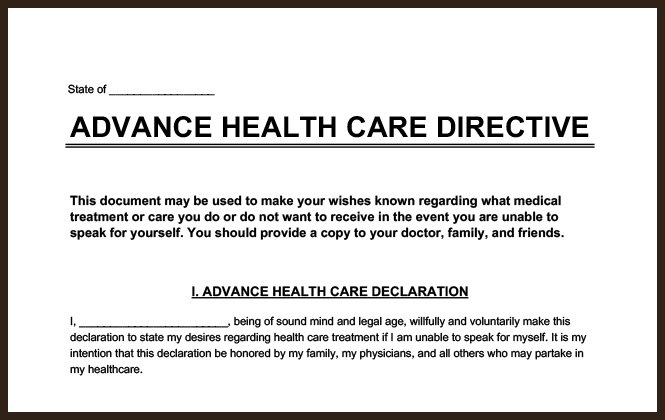I doubt there is a doctor in the world who hasn’t had to say “no” to a family member challenging the advance directive decisions of someone in their care.
When that fails, the family member might come to me as a lawyer, and I’ll have to give them the more wordy answer:
Family members cannot override an advance directive. Typically, they can only be overridden by the person it’s for or a licensed medical professional. They can be amended by a probate court order, but judges are generally reluctant to do so unless there are exceptional circumstances.
Of course, this is a rule of thumb for most jurisdictions in the USA. The laws in your state or country may differ. And every case is different, so read on to learn more about overriding advance directives.
In This Article
What Is A Health Care Advance Directive?
According to the National Institute on Aging, a health care advance directive, also known as a living will, is a legal document that allows a person to specify what actions should be taken for their health if they are unable to make decisions for themselves.
This can include appointing someone as a surrogate, proxy, agent, representative, or “attorney” to make particular healthcare decisions on their behalf. These powers come into effect when they are unable to make decisions for themselves (i.e. when they lack capacity, as determined by a doctor).
They usually look a bit like this:

Advance directives commonly include a person’s instructions relating to life-sustaining measures (such as artificial ventilation), palliative care, end-of-life care, and organ donation.
Most attempts to override an advance directive arise from family members taking issue with a patient’s:
- Choice of surrogate,
- Desire to not receive “life-sustaining measures”.
Why Can’t Family Members Override an Advance Directive?
It is natural for family members to feel upset with doctors who intend to not give their loved one “life-sustaining” care.
But one of the most fundamental ethical principles in medicine is “patient autonomy”. This is the principle that a person should be able to make their own health decisions as far as is possible.

If a person has expressed their healthcare preferences in an advance directive, doctors should comply with those wishes (with some exceptions). Even if family members disagree with these choices, they cannot override them.
Advance directives are designed to ensure clarity and certainty about medical treatments in situations where patients cannot speak for themselves.
Allowing family members to override these instructions would render advance directives meaningless.
So, Who Can Override an Advance Directive?
In general, an advance directive can only be overridden by the patient, court order, and in some cases, by a medical professional.
I’ll start with medical professionals – they’re a little tricky:
Medical Professionals
In theory, medical professionals should comply with patients’ end-of-life wishes, set out in their advance directives under the Patient Self-Determination Act 1990.
And in most black and white situations, they do. To do otherwise could open them up to legal liability.
However, it’s important to bear in mind that there may be complex circumstances where the wishes contained in the advance directive can’t be followed on a practical level. There may also be situations where ambiguity as to the patient’s actual wishes exist.
It’s also worth noting that some medical professionals may choose to “ignore” advance directives where they include instructions that run contrary to their personal morals or the hospital’s policies.
They aren’t supposed to do this. But it happens.
It’s why it’s important to have a surrogate who you can trust, and who understands your preferences, to advocate for you.
Court
Like most countries in the world, the exception to almost every regulation, federal, and state law in the USA is “unless a court orders otherwise”.

This is no different when it comes to advance directives.
In really hard cases where the decisions are unclear, doctor’s may apply to a court (typically a probate court) for guidance.
Or, if a family member believes the advance directive was made under pressure, duress, fraud or undue influence, they may apply for a court order declaring it invalid.
It goes without saying that obtaining such an order should only be pursued after seeking personalized legal advice to ensure proper understanding of the situation and applicable laws.
The Patient
The purpose of advance directive is to provide guidance to doctors when a patient does not have the ability to make decisions for themselves.
This means, if a patient has capacity, they can update, rescind, or vary their advance directive at any time. They are not bound to their previous decisions, and can override them at will.
So, if you have a family member with an advanced directive you think is a bad idea, and they have capacity – the first thing I’d suggest doing is simply talking to them about it.
If they don’t have capacity, you can still speak with their surrogate or medical team to express your concerns.
The Bottom Line
An advance directive is a legal document that allows individuals to specify their healthcare wishes in case they become unable to make decisions for themselves.
While family members may challenge these decisions, they cannot override them.
There are exceptions, but you will likely need to get a lawyer involved to make much progress in this regard.
And before you get to that point, I strongly advise having open conversations with all of those around you. In my experience, hard decisions are often resolved through hard conversations.
Disclaimer: The information provided in this article is for general informational purposes only and is not legal advice. This article does not create an attorney-client relationship between the reader and the author, nor should it be relied upon as a substitute for legal advice regarding your specific situation.









